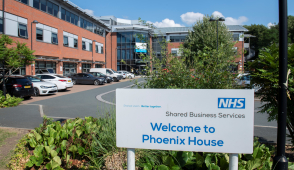NHS SBS: keeping the money moving
NHS England and NHS Improvement have made it clear that finance should not be a barrier to the care of patients with Covid-19. Staff clearly need to be paid as usual. But suppliers – so important, for example, to the NHS response in areas such as the supply of personal protective equipment – also need to be kept financially buoyant. In fact, the NHS is being encouraged to make significant improvements to its usual payment performance, targeting the payment of suppliers within seven days of the receipt of invoice or goods and services.
NHS SBS – a joint venture between the Department of Health and Social Care and Sopra Steria – is at the heart of efforts to keep cash flowing. It provides finance and accounting services to 74 NHS providers and arm’s length bodies and to all commissioning bodies through the Integrated Single Financial Environment (ISFE).
It deals in big numbers. In the last week of March, it paid 140,000 invoices, with £608m moving around the NHS and a further £627m being paid to organisations supplying goods and services to the NHS. As part of the new financial year and the new temporary finance regime, NHS SBS says it has moved some £20bn around the NHS.
Stephen Sutcliffe, NHS SBS director of finance and accounting, says the organisation was working ‘amazingly hard’ to support frontline staff – ensuring new suppliers are set up quickly and ensuring money keeps flowing so that the supply chain keeps moving. Other parts of NHS SBS are also closely involved with paying NHS staff, including registering more than 7,000 returning staff onto the payroll, and supporting procurement.
However, Covid-19 has brought its own specific challenges to the organisation and it has initiated its business continuity plan, which involves daily calls with NHS England and NHS Improvement. The nationwide lock down in India brought an immediate close to work in NHS SBS’s two India offices – in Noida and Pune. These offices host the organisation’s call centre and its 25-strong verification team – which verifies captured data from scanned invoices with a scan of the original invoice. NHS SBS has subsequently trained some 60 staff in the UK – pulling from different parts of the organisation – to pick up this verification work.
About half of the overall 500 staff in India are now enabled for home working and a UK call centre is also up and running, although this has limited capacity and the organisation is encouraging suppliers and clients to engage by email wherever possible.
A two-day backlog of invoices awaiting verification at the beginning of April has now been cleared. More recently the focus has been on the post room. Some 15,000 paper invoices are still received daily and these need to be scanned manually. Again, an initial backlog at the beginning of April has now been dealt with and NHS SBS says that rotas have been set up enabling safe working.
It estimates that just 15 people a day are physically going into the Leeds office, where the invoices are scanned. According to Mr Sutcliffe, who has also been helping out in the post room, keeping staff safe is the organisation’s over-riding principle during this period.
While the organisation has quickly managed a return to steady-state operation after the lockdowns in both India and the UK, it recognises that it needs to plan for the possibility that measures tighten even further. Plans have also been made for a scenario in which its Leeds office has to be fully closed, with all employees required to work from home. In this instance, invoices would be securely stored until staff return to the site. Suppliers wanting urgent payment would then be requested to resubmit invoices requiring urgent payment to the organisation’s urgent scanning email address.
NHS SBS’s clear preference is for suppliers to submit electronic invoices using a PEPPOL-compliant system. However, it already has some limited capacity to deal with emailed invoices with attached PDF documents, effectively scanning these documents and extracting the key data. ‘Given where we are, we will be accelerating this programme to strengthen this capability,’ says Mr Sutcliffe (pictured). ‘We are testing this at the weekend and hope to go live with that soon.’
Checking discrepancies between invoices and purchase orders (where purchase orders have been raised) and getting approval and final sign-off for payments is also a key part of the overall purchase-to-pay process. This is also made more difficult by the current situation.
Many finance staff in providers and commissioners are now working from home or are working to support the frontline in other roles. And there will be some finance team members who are unable to work because they are ill themselves or self-isolating. This can mean that it is harder to track people down, which can delay the approval process. And, of course, it is already a busy time for finance departments with accounts needing to be finalised.
The NHS has been encouraged to improve supplier payment times – targeting seven days from receipt of goods or invoice. And where invoices are disputed, the undisputed elements should be paid, with the disputed elements resolved within a further seven days.
This would mark a major step-up in performance. All NHS bodies are expected to comply with the better payment practice code, which requires 95% of undisputed invoices to be paid within 30 days. Although figures on performance against the code are not published nationally, reports in individual trusts’ annual accounts suggest that many providers fail to achieve this target. And Mr Sutcliffe says that payment can often extend to over 40 days.
This poor performance is driven by the limited access to cash in NHS providers. However, as part of the new temporary financial regime, introduced to support the NHS during the Covid-19 response, providers are being given a cash buffer. With new block contract arrangements in place, providers are effectively receiving two months’ cash during April – with payments on 1 April and 15 April. Subsequent payments will be made on the 15th of each month – meaning providers should have sufficient cash to support prompt payment.
Mr Sutcliffe says that achieving seven-day payments would be ‘very challenging’. But the ability to make those payments is there and for the absolutely critical suppliers, it can be done. ‘If it moves us towards paying suppliers quicker than we are doing today, it would be a huge step forwards,’ he says.
Related content
We are excited to bring you a fun packed Eastern Branch Conference in 2025 over three days.
This event is for those that will benefit from an overview of costing in the NHS or those new to costing and will cover why we cost and the processes.